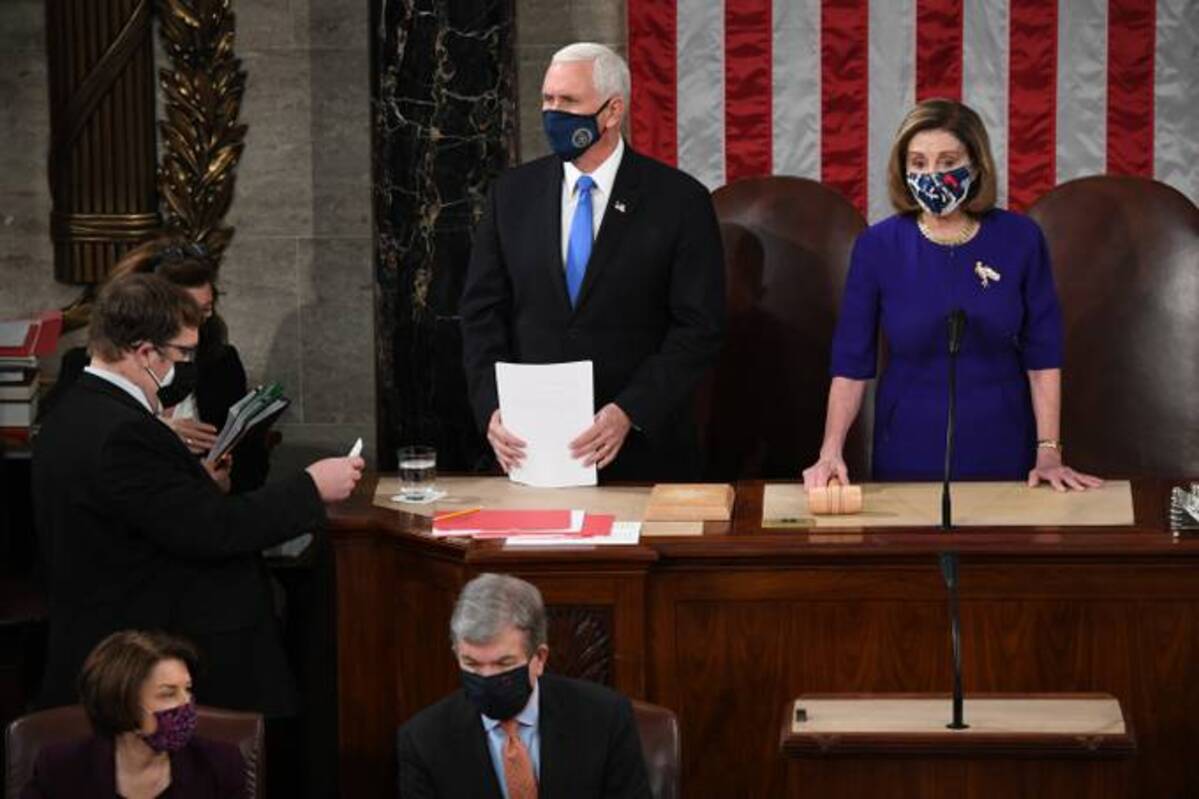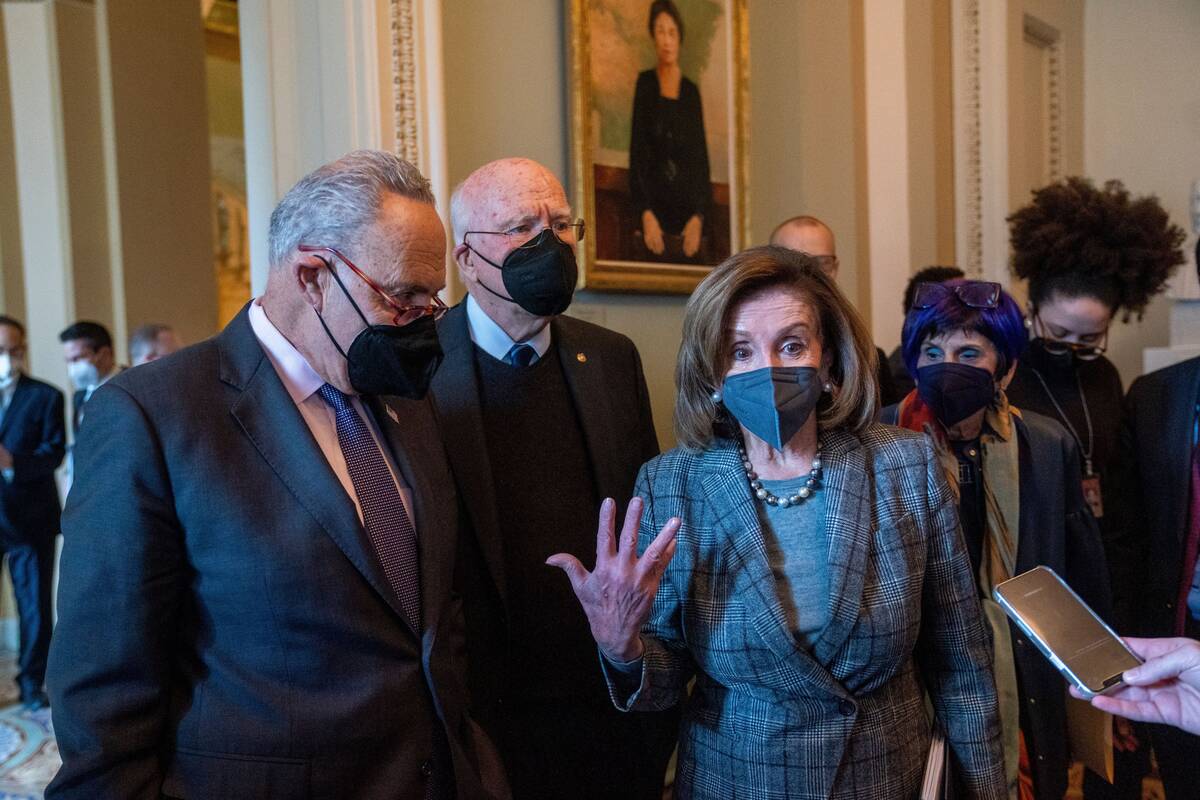| |  | On the Hill | | Trump's election comments help give ECA effort new life |  Ex-president Donald Trump thinks his then vice president, Mike Pence, could and should have overturned the 2020 election results. (Saul Loeb/Pool via AP, File) | | | Former president Donald Trump's effort to undermine the results of the 2020 election sparked lawmakers' efforts to revise the Electoral Count Act, the ambiguous 19th century law that governs how Congress certifies presidential election results. Trump's frank comments in recent days about his desire to see Joe Biden's victory "overturned" are giving new momentum to Democratic and Republican senators efforts' to rewrite the law, as our colleague Mike DeBonis reports. Trump has seized on the push to update and clarify the ECA as evidence that his vice president, Mike Pence, had the power to reverse the election results. "Actually, what they are saying, is that Mike Pence did have the right to change the outcome, and they now want to take that right away," Trump said in a statement on Sunday. He hit the point again Tuesday morning, arguing that Pence "could have sent the votes back to various legislators for reassessment after so much fraud and irregularities were found." Of course, Trump is beating a dead horse: There's no evidence of any fraud widespread enough to change the election results in even a single state. And Trump's claim the ECA gave Pence the power to throw out the results "is heavily disputed by legal scholars and officials from both parties," as DeBonis notes. | | But Trump's comments — his "most direct public acknowledgment to date of his intentions surrounding the Jan. 6 proceeding — roiled Capitol Hill, where lawmakers of both parties sought to keep the discussions on track even as questions arose about whether Republicans would ultimately agree to buck the former president and revise the law." "I think everybody knows this law needs to be clarified, except perhaps the former president," Sen. Angus King (I-Maine) told DeBonis. "I think his comments only underline the fact that it needs to be clarified." Top Republicans, including Senate Minority Leader Mitch McConnell (R-Ky.), remain "open" to discussions. McConnell says the law is 'clearly flawed and needs to be updated,' while Minority Whip John Thune (R-S.D.) suggested Trump's comments could actually help forge a deal." "'Clarifying it makes sense,' Thune said, adding that Trump's comments 'perhaps add additional arguments in favor of trying to fix this and slam the door shut on this once and for all.'" | | There are two parallel efforts underway to revise the ECA. Sens. Amy Klobuchar (D-Minn.), Dick Durbin (D-Ill.) and King debuted a draft bill on Tuesday to update the law. And a separate bipartisan group of senators has been meeting in recent weeks to try to hash out a compromise that can survive a Senate filibuster. Many Democrats dismissed the idea of rewriting the ECA last month as a distraction — Senate Majority Leader Chuck Schumer (D-N.Y.) said it "made no sense" — while the party labored to pass a pair of voting rights bills. But those bills failed on the Senate floor due to the opposition of Sens. Joe Manchin (D-W.Va.) and Kyrsten Sinema (D-Ariz.) to changing the chamber's filibuster rules, and now Democrats are coming around. "Sen. Susan Collins (R-Maine), a leader of the bipartisan group, said she spoke to senior Biden aide Steve Ricchetti in recent days about the talks," DeBonis reports. "'It's clear that they're interested,' she said." "There'll be some Republicans that will see a heightened need to fix the infirmities in the Electoral Count Act, and there'll be others that will not want to break with the president, but I still see a path to 60," Sen. Chris Murphy (D-Conn.), another member of the bipartisan group, told DeBonis. | | It's unclear what, if any, proposals included in Democrats' voting rights legislation might find their way into a bipartisan compromise. The bipartisan groups of senators "met over pizza Monday night and broke into smaller groups to focus on areas of possible compromise that go beyond the text of the ECA to include a narrow set of issues related to elections, such as protections for election workers, funding, presidential transitions and voting practices," the Wall Street Journal's Eliza Collins and Lindsay Wise report. Outside groups that pushed hard to pass the voting rights bills are pushing to preserve some of their top priority, according to Adam Bozzi, a spokesman for End Citizens United, which lobbied to pass the voting rights legislation. "ECU is involved in preliminary discussions with other groups about what a ECA reform bill might look like," Bozzi wrote in an email to The Early. "They believe it must include measures to protect voters, not just vote counting, starting with the John Lewis Voting Rights Advancement Act. Including provisions that protect election officials from being replacing arbitrarily is also a priority." | Democrats, GOP to meet to pass new government funding bill, avert shutdown |  House Speaker Nancy Pelosi (D-Calif.) and Senate Majority Leader Charles E. Schumer (D-N.Y.) respond to questions following a meeting in the Capitol on Feb. 1. (Shawn Thew/EPA-EFE/Shutterstock) | | | Happening today: "Top Democrats and Republicans are set to huddle in pursuit of a deal that could fund the federal government for the remainder of the fiscal year, hoping to stave off a shutdown while potentially pumping new spending into health care, education, science and defense," our colleague Tony Romm reports. | - "The upcoming discussions mark the second consecutive day of private meetings on Capitol Hill, as lawmakers who oversee the federal purse increasingly have come to express a measure of confidence that they can act before an upcoming Feb. 18 deadline — and overcome months of prior political disputes and delays."
- "Democrats seek significant boosts in federal domestic spending, now that the country for the first time in a decade is not bound to strict budget caps. Writing to her caucus last week, [House Speaker Nancy Pelosi (D-Calif.)] endorsed the need for a 'strong omnibus' that would 'address critical priorities for our country, including for our national security and for communities at home.'"
| | But "budget hawks in both parties have raised alarms about the country's growing debt, which the Treasury Department said this week had topped $30 trillion," Romm writes. "Debt has accumulated more rapidly in the past two years because of a series of emergency stimulus initiatives enacted to address fallout from the pandemic." | - "The borrowing binge, which many economists viewed as necessary … has left the nation with a debt burden so large that the government would need to spend an amount larger than America's entire annual economy in order to pay it off," the New York Times's Alan Rappeport reports.
| | |  | At the White House | | Biden launches effort to sway GOP senators on Supreme Court nominee | | All the president's negotiators: "Biden called McConnell to discuss his upcoming Supreme Court nomination. He hosted the top Republican on the Senate Judiciary Committee and asked him, along with the Democratic chairman, to suggest potential justices. And top White House aides began reaching out to GOP senators to seek their input," our colleague Seung Min Kim reports. | - "Together, those actions Tuesday launched Biden's effort to project at least a veneer of bipartisan consultation as he sets out to make his first pick to the Supreme Court, replacing Justice Stephen G. Breyer. The White House is hoping to smooth the way for Biden's upcoming choice even though the Senate in recent years has been an increasingly vicious battleground for such nominations."
- "Although Democratic senators, if all are present, would not need Republicans to confirm Biden's eventual nominee, administration officials are working assiduously to ensure his pick does not become only the second Supreme Court justice in well over a century to be confirmed without bipartisan support."
- "The Constitution says 'advice and consent,'" Biden said in brief remarks in the Oval Office before meeting with Durbin, [chair of the Senate Judiciary Committee], and Sen. Charles E. Grassley of Iowa, the committee's senior Republican. "And I'm serious when I say it, that I want the advice of the Senate as well as the consent, if we can arrive on who the nominee should be."
- "Separately, McConnell hosted the 11 GOP senators on the Judiciary Committee for a strategy session at midday Tuesday, and Republicans left the meeting promising that Biden's pick would get fair consideration."
| | Hail to the sherpa: A key member of Biden's bipartisan coalition is former Democratic senator Doug Jones (Ala.). | - "With his selection of Jones, Biden appears to be offering a pre-emptive olive branch," the New York Times's Katie Rogers writes. "Jones was the first Democrat in decades to hold a Senate seat in deep-red Alabama, and he frequently co-sponsored bipartisan legislation during his three years in the Senate."
| | |  | The Media | | | |  | Viral | | | All news is local news!!! |  | | | | | | AM/PM | | Looking for more analysis in the afternoon? | | | | Weekday newsletter, PM |  | | | | | | |









No comments:
Post a Comment